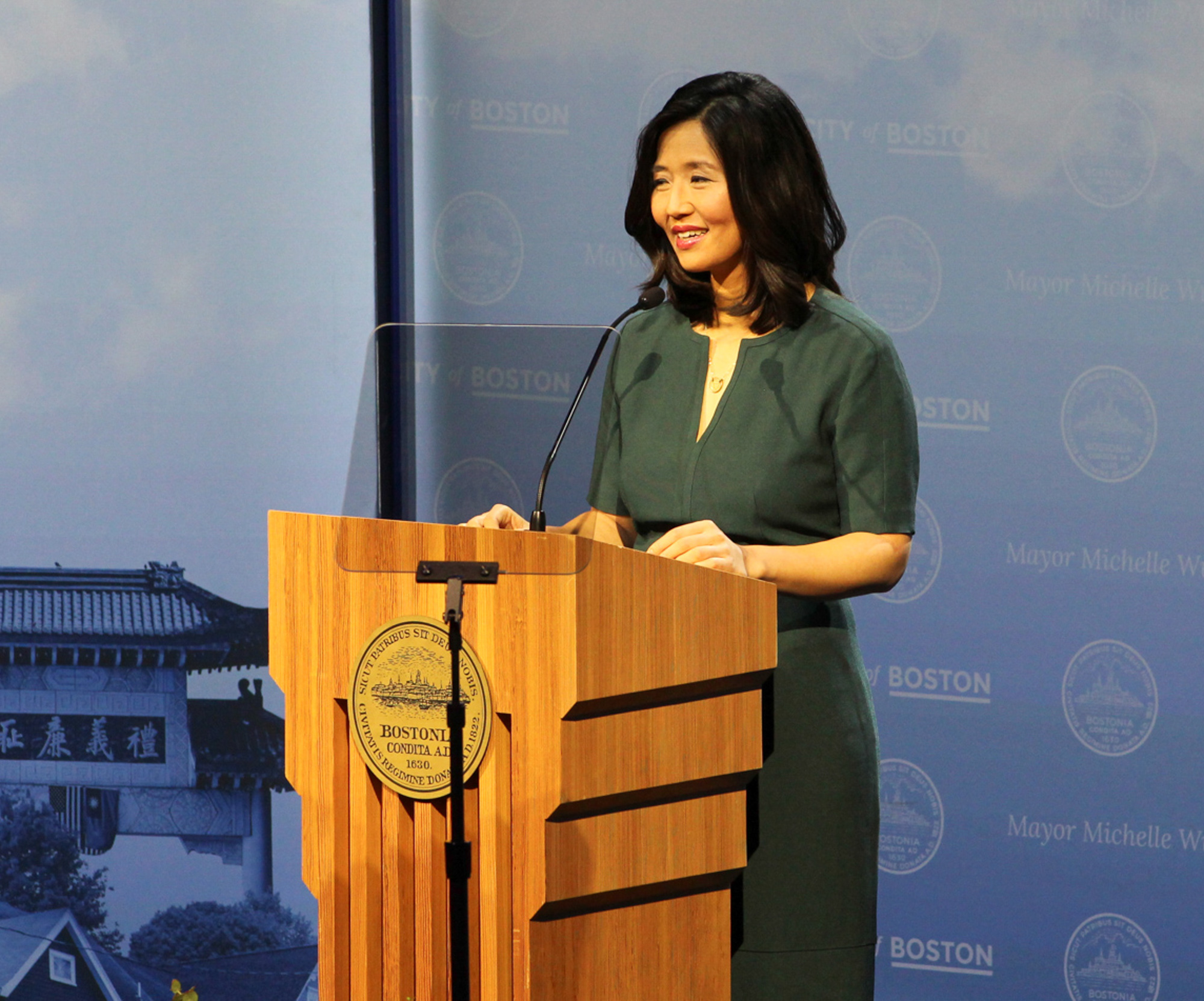Fresh off widespread coverage of her State of the City address, Mayor Michelle Wu announced on WBUR Tuesday that her re-election campaign will launch April 5. The mayoral race will officially be between Wu and Democratic challenger Josh Kraft, president of the New England Patriots Foundation.
A poll released by Emerson College late February shows voters’ preferences so far, with Wu remaining well in the lead with a comfortable 43% of voters. Kraft is in second place with 29%, with other peripheral candidates winning over a collective 4% of those polled.

Launching his campaign Feb. 4, Kraft argued the incumbent mayor has failed to deliver on key campaign promises.
The biggest policy differences between Wu and Kraft are on housing.
Kraft previously criticized Wu’s initiatives to increase affordable housing, such as in a March 19 X post.
Wu has pushed for rent caps in Boston, but the proposal is still being debated in the Massachusetts Legislature.
In its place, Kraft argued for an “opt-in” rent control system. Under this plan, landlords would receive tax rebates in exchange for limiting rent increases.
In terms of transportation, throughout her tenure, Wu pushed for the creation of more bus and bike lanes. Kraft, conversely, has argued for a pause on the development of any new bike lanes.
With housing playing such a major role in Kraft’s platform, he has emphasized he is running for “regular people.”
Boston University senior Sean Waddington, who is the current treasurer of BU College Democrats, said Kraft is running “because he can.”
“He thinks that that qualifies him to be mayor, because he can self-fund. He doesn’t have an answer to anybody,” Waddington said. “It’s a very white savior and imbalanced relationship.”
Waddington said Wu is at a disadvantage in terms of funding but has a better resume.
“Michelle Wu is probably not going to out-fundraise Josh Kraft purely because of how much money he has,” Waddington said. “He’s going to spend as much money as he can, as much as he wants, but that can’t make up for having not been a Boston resident until last year.”
Some of Wu’s largest endorsements so far have been from labor workers. Tom McKeever, president of SEIU Local 888, said the mayor “has proven herself to be a true champion for the working people.”
“Mayor Wu completely gets it,” McKeever said, referring to Wu’s stances on housing and wages. “She’s an absolute humanitarian, and she understands the struggle of our members.”
Comparatively, Kraft has fewer labor endorsements, with his largest announced union backing being from the New England Dock and Marine Council.
Several major business figures also contributed to Kraft’s campaign, such as owner of the Kraft-owned New England Revolution Major League soccer team Brian Bilello, car dealership billionaire Herb Chambers and Liberty Mutual CEO Tim Sweeney, according to The Boston Globe.
Despite these contributions, Waddington said Wu’s advantage lies in “her ground game” and said the mayor has “a multi-generational, multi-ethnic coalition across Boston.”
BU junior Vijay Fisch saw some of the demands of Kraft’s campaign as part of a wider dissatisfaction with City Hall on issues such as education.
“Boston public schools are really going through a tough time,” Fisch said.
School boards, in particular, are one topic that Kraft has aimed to distinguish himself from the incumbent. Currently, Boston’s school boards are entirely appointed by the mayor.
Kraft has opted to argue for a mix of appointed and elected board members, a position Wu appeared to also share, though she vetoed an earlier proposal to switch to a fully elected board.
On environmental policy, Kraft’s campaign has made less of an effort to differentiate itself from Wu’s, instead pointing to her perceived failure.
Bill Masterson, founder and executive director of Tree Eastie, a nonprofit dedicated to planting trees in East Boston, said Wu has been “active in environmental circles.”
Masterson also raised concerns over the rapid development of neighborhoods like East Boston.
“The values five years ago were pretty depressed,” he said, noting that such trends have accelerated under Wu. “I think that attracted a lot of developers to come in and look at properties that could be gentrified.”
Another development project is the White Stadium renovations, which is estimated to cost $200 million. Wu has advocated for the project.
After receiving scrutiny from the public, Kraft seeks to put a full stop on related, ongoing construction.
McKeever said the stadium’s renovation should be more “secondary” to goals like those surrounding housing.
Fisch said Wu has fallen short in areas like MBTA improvement, police accountability, a coordinated response to homelessness and the lack of support for student organizers.
“Frustration with the status quo frequently can be what causes people to be frustrated with the mayoral office,” he said.



















































































































Thomas J.Cunnally • Mar 28, 2025 at 8:18 am
I was born and raised in Boston. And think Mayor Wu has to go. She is basically in a job way above her pay grade. Boston has become a city ridden with criminals, drug dealers and homeless. And the housing problems are driving our best and brightness out of the city.